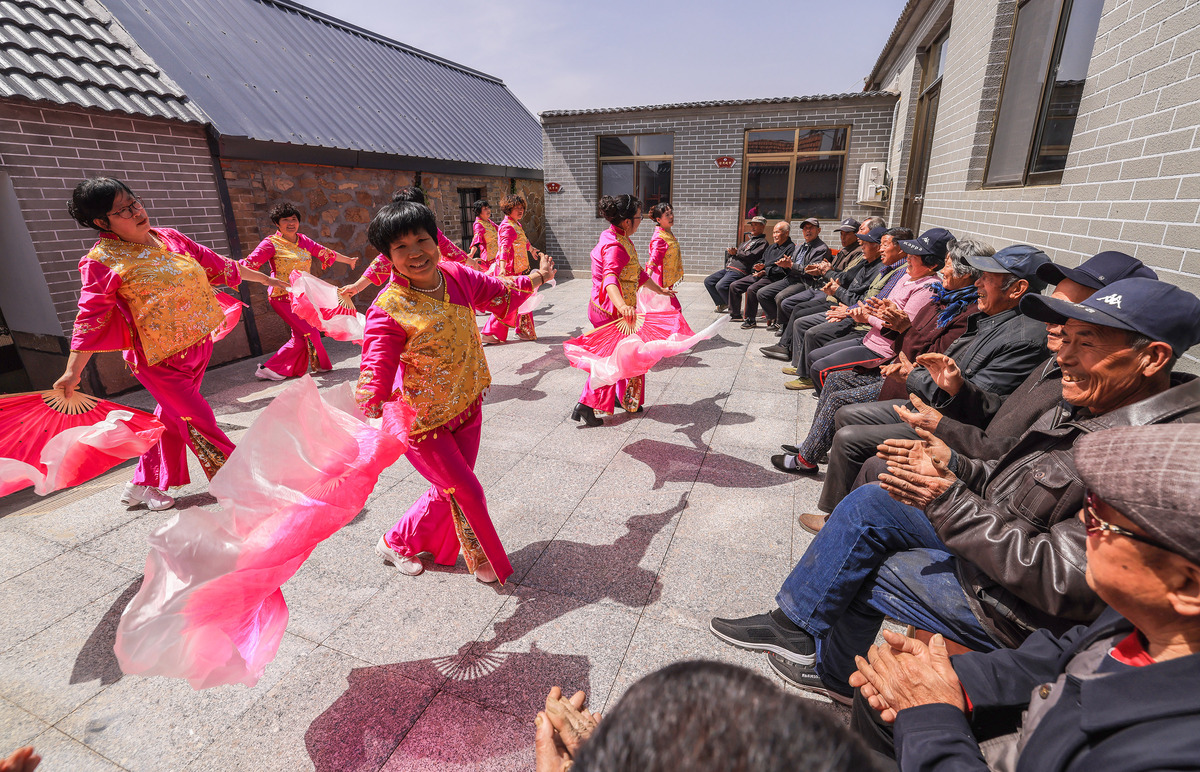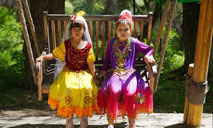Rise of knowledge- and tech-intensive society
Volunteers perform a folk dance to entertain the elderly on the premises of a canteen in Jiakuangmajia village, Rongcheng city, Shandong province, on April 16. Rongcheng operates 363 canteens that offer free lunches to 12,000 rural people aged above 80. [Photo/Xinhua]
Aging population set to strengthen workforce, stoke consumption, upgrade industry
In an aging society where consumption upgrade is the new normal, elderly Chinese consumers are pursuing high-quality lifestyles with gusto-and their choices and preferences are spurring the growth of the so-called silver-haired economy comprising multiple sectors like elderly care services and elderly tourism.
Compared with other countries, China's aging society is characterized by a large population base. Currently, Chinese people aged 60 and above number 264.02 million, or 18.7 percent of the total population, up 5.44 percentage points from the level seen in 2010, according to China's latest national census.
Their number-264 million-is humongous, and larger than the collective population (217 million) of Germany (around 84 million), the United Kingdom (68 million), and France (65 million). For perspective: the population of the United States is around 333 million.
The elderly segment of the Chinese population is bound to receive attention this year that marks the start of China's 14th Five-Year Plan period (2021-25). The first year of the plan's implementation of national strategies will see an active response to the challenge of serving a large aging population.
In late May, China announced its latest policy to allow all married couples to have up to three children, scrapping the earlier second-child policy. The country also aims to gradually raise the age for retirement to increase the total workforce.
"An increasing number of elderly people could mean an opportunity to have a large workforce with in-depth knowledge and solid work experience," said Fu Yifu, a senior analyst at the Suning Institute of Finance, a research institution of Suning Finance.
"The increase of average life expectancy is expected to promote the increase of average years of schooling, and thus raise the overall quality of workforce in China, and the accumulation of human capital will help make up for the decline of demographic dividend," Fu said.
"An aging trend is also expected to drive the upgrading of industrial structure from labor-intensive to knowledge-and technology-intensive, and inject impetus into the high-quality development of national economy," he said.
Given different consumption habits and preferences of different age groups, favorable policies and more investments from business entities are urged to satisfy the demand for upgrade in the elderly consumption market, industry players said.
 |
Photos
Related Stories
- China’s aging population a new gold mine for economy
- Elderly-friendly center in Shanghai creates novel plans to cope with the aging population
- HK to set up neuroscience research center with world's top universities to tackle aging population
- Aging population brings business for travel sector
- China’s aging population to reach peak of 400 million by 2055
Copyright © 2021 People's Daily Online. All Rights Reserved.











